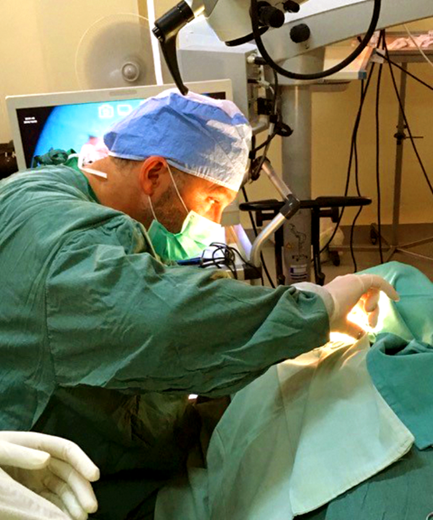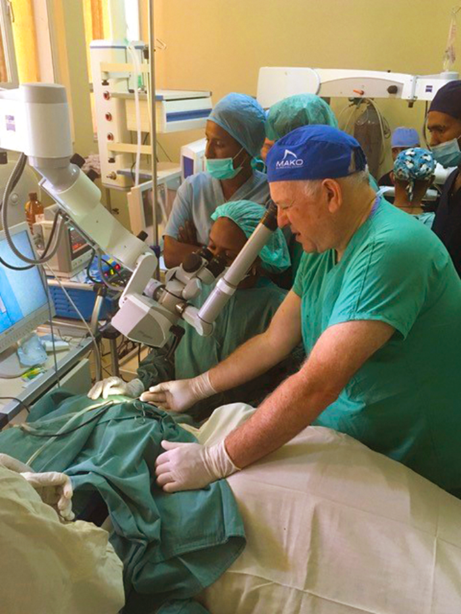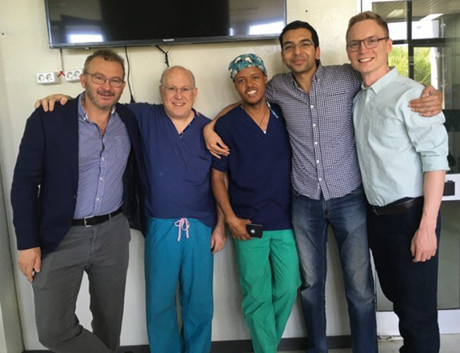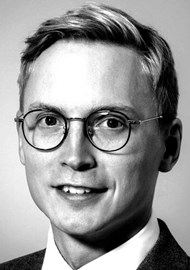In the July/August edition of the magazine, we featured an article on humanitarian work in Ethiopia, focusing on head and neck surgery. Continuing this theme, Misha Verkerk tells us about an international collaboration providing otology care and training in that country.
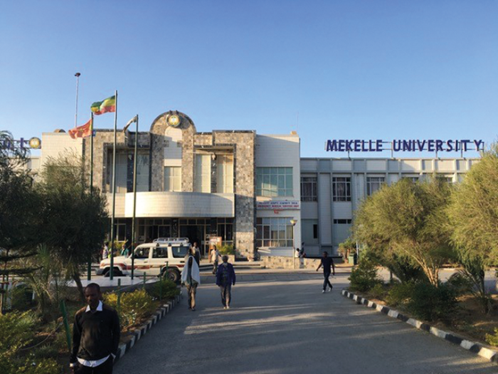
The Ayder Referral Hospital is a 500-bed facility linked with Mekelle University and Medical School.
Global ENT Outreach (GEO) is a non-profit organisation committed to creating sustainable improvements to the medical and surgical care of people with ear disease worldwide. In 2017, the team travelled to Mekelle, Northern Ethiopia to provide hands-on training and deliver care to the local population.
Of Ethiopia’s 104 million inhabitants, almost 80% live in rural communities. Currently, the population is served by 23 fully-trained ENT doctors (a ratio of 1:4.5 million). In contrast, the UK has approximately one ENT surgeon per 100,000 population [1]. Most Ethiopian ENT doctors live and practise in the nation’s capital, Addis Ababa, restricting many from accessing ENT services and resulting in a significant burden of untreated ear disease.
Global ENT Outreach
Founded in 2000 by US Otologist, Richard Wagner, Global ENT Outreach is a non-profit organisation that aims to prevent avoidable deafness and death from ear disease through hands-on training of doctors, developing programmes in public health, advocating initiatives, developing partnerships with local healthcare organisations and performing ear surgery. Key achievements to date include working with local ENT doctors to establish temporal bone labs in Peru, Paraguay, Cuba and Cambodia, as well as delivering care, free of charge, for patients with ear disease in remote rural areas of Bolivia and Samoa.
Mr Jeremy Lavy, Consultant Otologist, leads the UK mission to Ethiopia.
Dr Richard Wagner, CEO of Global ENT Outreach, provides hands-on training
to local ENT doctors at the Ayder Referral Hospital, Mekelle.
Background to the Ethiopia mission
The idea behind the present mission to Ethiopia came from the friendship between Dr Wagner and the Ethiopian ENT Surgeon, Dr Nega Kiros. Dr Kiros was the recipient of the 2016 Humanitarian Award from the American Academy of Otolaryngology-Head and Neck Surgery and has led a number of humanitarian missions in Ethiopia. A native of Mekelle, the capital city of the northern Tigray region of Ethiopia, Dr Kiros is acutely aware of the unmet needs of the communities in that region. Otosclerosis and chronic otitis media are common and socially isolating; children and adults with deafness and foul-smelling discharge from chronic ear disease are at risk of becoming social outcasts.
“Otosclerosis and chronic otitis media are common and socially isolating.”
Most of the practising Ethiopian ENT doctors gained their training overseas until a few years ago when an otolaryngology residency programme was started in Addis Ababa: thus, the level of surgical experience is low compared to Western standards, especially in otology. Audiometry is routinely performed by nurses or doctors with minimal training in audiology and often without the benefit of a soundproof booth. However, there is a strong motivation amongst local clinicians and government to create sustainable improvements in healthcare. Just six years ago, the only ENT centres in the country were in Addis Ababa.
Now, there are five ENT units around the country, one of which is located in the city of Mekelle. Mekelle’s Ayder Referral Hospital is well-supported by the Ethiopian Department of Health, which has invested not only in the hospital infrastructure but also in surgical equipment, such as flexible naso-endoscopes and operating microscopes.
Ayder Rural Referral Hospital, Mekelle
This beautifully designed 500-bed facility has been fully functional for only nine years. The ENT department (literally translated from Amharic as ‘department of the neck and above’) is staffed by two ENT specialists and four first-year residents. Dr Yilkal Zemene – an Ethiopian ENT Specialist with international fellowship training - heads the department and founded the region’s first otolaryngology residency programme there last year. The hospital has dynamic young leadership and is rapidly expanding. It has nine adult ICU beds, nine paediatric and nine neonatal ICU beds. The hospital is developing the only oncology services in the region; chemotherapy is available and construction has begun on a cancer centre, which will offer radiotherapy. There is an exciting atmosphere of progressive change in Mekelle and local leaders are striving to improve the state of health for the population.
The first mission
The GEO-Ethiopia mission aims to work with the ENT specialists and hospital leadership to raise the standards of care for those suffering with ear disease in the region. The first step towards achieving this goal was to develop education for the local doctors, focusing on hands-on surgical training for residents and specialists as well as improving diagnostic skills in clinic and redesigning the residents’ curriculum.
The inaugural visit to Mekelle took place in April 2017. The team consisted of Dr Richard Wagner, Mr Jeremy Lavy (Consultant Otologist at the Royal National Throat, Nose & Ear Hospital, London) and two UK trainees. We were kindly hosted by Dr Zemene and Mekelle University, who welcomed us to their country with truly exceptional hospitality.
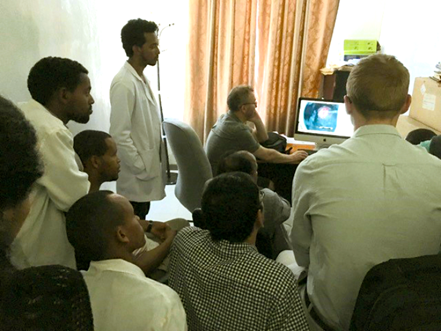
The surgical team gathers for teaching after a long day in the operating theatres in Mekelle.
The GEO-Ethiopia team (l-r): Jeremy Lavy, Richard Wagner, Yilkal Zemene, Rajeev Mathew and Misha Verkerk.
During the week-long visit, GEO performed 36 major ear cases (including 17 stapedectomies and nine mastoidectomies), mostly under local anaesthesia with sedation. Intensive hands-on training was provided for the local residents and specialists. After each day in the operating theatre, the team would debrief by discussing video recordings of the surgery to better understand surgical decision-making and key techniques. A critical feature for any humanitarian mission is ensuring safe follow-up for the cases treated; this was possible through the local ENT department in Mekelle. Moreover, through generous charitable donations from Storz (Germany), Kurz (Germany) and Medtronic (USA), GEO was able to donate otology instruments to the ENT department at the end of the visit.
“There is a strong motivation amongst local clinicians and government to create sustainable improvements in healthcare.”
I was humbled by some very memorable cases. One young child had travelled 700km by bus with her mother simply to have a stone removed from her ear canal, demonstrating just how difficult access to care is in this country. Another 19-year old girl attended clinic with a large glomus tumour that had almost completely obliterated her temporal bone together with the function of cranial nerves VII to XII; this was, sadly, untreatable. More rewarding was seeing patients with decades of hearing loss due to otosclerosis have their hearing restored with stapes surgery.
Trainee involvement
GEO has always encouraged medical students, trainees and fellows to volunteer on its missions. As a trainee, it was a hugely humbling experience to be involved in this project, and one that I will remember throughout my career. Not only can trainees be valuable members of the team, helping with logistics, teaching clinical skills, assisting in theatre and collecting data; the experience is also an invaluable training opportunity because of the sheer volume of advanced disease, and helps those trainees with an interest in humanitarian work develop a deeper understanding of the challenges of surgery in resource-poor settings.
“There is a strong motivation amongst local clinicians and government to create sustainable improvements in healthcare.”
The GEO-Ethiopia team (L-R): Jeremy Lavy, Richard Wagner, Yilkal Zemene, Rajeev Mathew and Misha Verkerk.
The vision for the future
GEO aims to run two-to-three missions each year in order to continue to develop the services in Mekelle. However, following the GEO model of care used worldwide, in addition to these short visits we plan a series of longer term initiatives to create sustainable improvements to otology in the region:
- Improve audiology services and hearing aid provision through a programme of education and charitable donations.
- Develop a temporal bone lab and temporal bone dissection course.
- Establish an otology fellowship in Mekelle for senior trainees from USA, Europe, Australia and New Zealand to gather experience in a developing country and the opportunity to impact the lives of others.
- Provide advanced training to Ethiopian ENT doctors who have an interest in ear diseases, either in-country or through fellowships and observerships abroad.
How to get involved
Global ENT Outreach is keen to hear from consultants and senior trainees interested in volunteering on the Ethiopia mission (email: misha@geoutreach.org). For further information, readers can visit our website (geoutreach.org) or Facebook or Twitter page. Charitable donations towards the mission can be made securely through our website.
References
1. Fagan JJ, Jacobs M. Survey of ENT services in Africa: need for a comprehensive intervention. Global Health Action 2009;2.
SUMMARY
-
Global ENT Outreach (GEO) is a non-profit organisation that aims to improve care for those with ear disease in low and middle income countries.
-
Ethiopia has one ENT surgeon for every 4.5 million people and a great unmet burden of ear disease.
-
GEO has established an active mission to Ethiopia, with a successful inaugural visit in April 2017.
-
Plans are underway to develop a fellowship programme and temporal bone lab in the region.
Declaration of competing interests: Misha Verkerk is the UK Representative for Global ENT Outreach; this is a voluntary, unpaid position.

